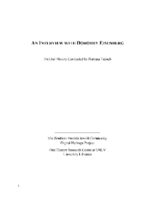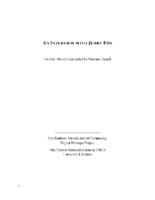Search the Special Collections and Archives Portal
Search Results

Transcript of interview with Norma Friedman by Barbara Tabach, November 19, 2015 and April 06, 2016
Date
Archival Collection
Description
It was a scorching Fourth of July, when Norma (n?e Adler) and Leon Friedman rolled into their new home of Las Vegas in 1973. Nevertheless, they were content with leaving Gary, Indiana behind, and starting fresh with the family?s new ownership of Walker Furniture. Norma recalls her first stop in checking out Las Vegas was to visit the synagogue ? Temple Beth Sholom being the only option. Her oldest son would soon become a bar mitzvah. Feeling good about that, she and her sister-in-law who was also relocating to Las Vegas for the furniture business, searched for new homes. Norma settled into the community through volunteer work as well as through employment outside the family business. She worked in the real estate briefly and in a jewelry store at the Dunes. A natural organizer, she immersed herself in religious and civic organizations including the Jewish Federation, Jewish Family Service Agency, and volunteering at Selma Bartlett Elementary School in Henderson. Norma shares stories of her Jewish heritage and upbringing in Pittsburgh, the decision to move to Las Vegas, making fast friendships during her life in Las Vegas and the joy she has in traveling the world with Leon, who passed in 2004. In 2017, Norma was honored by the Jewish Family Service Agency.
Text

Transcript of interview with Freddie Glusman by Barbara Tabach, October 29, 2015
Date
Archival Collection
Description
In this interview Glusman discusses his early memories of being raised in Vancouver, Canada and how he ended up in Las Vegas. He reflects on how he first got his start in the town and his early dealings with casinos and their owners while he was working as a carpet and drapery salesman and while working for Fabulous Magazine. Glusman explains how he started his restaurant and tells about the people he encountered while doing this that where significant to both the Jewish community and Las Vegas as a whole. He recounts stories that include such people as Meyer Lansky, Al Sachs, and Moe Dalitz.
Text

Transcript of an interview with Gertrude Rudiak, Richard Rudiak, and Dani Ramage by Barbara Tabach, December 30, 2015
Date
Archival Collection
Description
On December 30, 2015, a few months after her 100th birthday celebration, Gertrude Rudiak, with the help of her son Richard Rudiak and granddaughter Dani Ramage, reminisced about living in Las Vegas since 1946, nearly eighty years. They explore the ancestral roots of Gertrude (n?e Rightman) and of her deceased husband George Rudiak. Their courtship and marriage at the brink of World War II and George?s enlistment in the US Army Corps is what brought the couple to Las Vegas and the gunnery school which is now Nellis Air Force Base. After his tour of duty, George settled into a law practice where he specialized in quickie-divorces, but also carved out a reputation supporting civil rights and working for legislation to eliminate working and living discrimination of blacks in Nevada. Gertrude was an active member of Las Vegas. She played the pipe organ, hosted large Seders at Passover and managed the Rudiak household that grew to include five children. Over her long life, Gertrude embraced many positions on community boards, including being Temple Beth Sholom?s first female board member. She was also a teacher in both secular and Jewish education. Her efforts have been recognized by the Jewish National Fund, the United Jewish Appeal, and the Anti-Defamation League. Additionally, Mayor Carolyn Goodman presented Gertrude with the distinguished honor of a key to the city of Las Vegas in 2014. The city declared August 2, Gertrude's birthday, Gertrude Rudiak Day in recognition of her long-standing commitment to Las Vegas.
Text

Transcript of interview with Priscilla Schwartz by Barbara Tabach, June 16, 2016
Date
Archival Collection
Description
In this interview, Schwartz talks at length about her passion for compassionate hospice care, and her broad involvement with the Nathan Adelson Hospice, from volunteering to serving on the board to philanthropy, which included opening the Walter Schwartz Center for Compassionate Care. Schwartz also talks about other philanthropic giving which includes establishing scholarships at George Washington University and University of Michigan as well as support to Temple Beth Sholom gift shop.
Text

Transcript of interview with Oscar Goodman by Claytee D. White November 10, 2014
Date
Archival Collection
Description
Oscar Baylin Goodman (1939- ) is the former mayor of the city of Las Vegas, Nevada, serving 12 years until 2011, when he swore in his wife of over 50 years, Carolyn Goodman. Oscar Goodman is the official ambassador of Las Vegas, and the chairman of the Las Vegas Convention and Visitors Authority (LVCVA) Host Committee. He is also known as one of the best criminal defense attorneys in the United States, and spent 35 years defending alleged Mob figures such as Meyer Lansky, Frank Rosenthal, and Anthony Spilotro. Goodman is the primary visionary and a member of the board of directors of The Mob Museum in downtown Las Vegas, which opened in 2012. Goodman was born June 26, 1939 in Philadelphia, Pennsylvania. He earned his undergraduate degree from Haverford College in 1961 and his law degree from the University of Pennsylvania Law School in 1964. That same year he moved to Las Vegas and in 1965 he was admitted to the Nevada State Bar. He served as Clark County?s chief deputy public defender from 1966 to 1967. Goodman was elected as mayor of Las Vegas for the first time in 1999. During his three terms (the legal limit), he contributed to the economic and cultural development of the downtown area by supporting projects such as the arts district and Union Park, a high-rise residential and business project he helped to secure 61 acres of land for. He helped to begin what he called the ?Manhattanization? of downtown, which included the construction of taller buildings for better use of the area?s prime real estate. In this interview, Goodman discusses the role of Judaism in his life, from childhood to adulthood to parenting his own four children. He touches on his involvement with Temple Beth Sholom, including serving as its president, as well as in local development projects like the Lou Ruvo Cleveland Clinic Brain Health Center, Smith Center for the Performing Arts, and Mob Museum. In addition, Goodman discusses the impact of Jewish residents on the city and its development, and mentions leaders in the gaming industry, legal profession and in politics.
Text

Transcript of interview with Lovee duBoef Arum by Barbara Tabach, November 1, 2016
Date
Archival Collection
Description
Lovee Arum is the Chief Financial Officer of the Morris A. Hazan Family Foundation and Director of Hospitality for her husband Bob Arum?s boxing promotion company Top Rank. She holds a Nevada Real Estate Broker Sales License and was a partner in Western Linen (a Las Vegas linen rental and laundry company) for many years. Arum is a volunteer and philanthropist in the Las Vegas, Nevada community and works with organizations such as Temple Beth Sholom and the Nathan Adelson Hospice. In this interview, Arum reflects upon her childhood in Beverly Hills, California, and first experiencing Las Vegas after her father, Morris Hazan, established Western Linen. She discusses adjusting to Las Vegas life after moving to the city with her first husband, Larry duBoef, in 1963, and raising her daughter and son within the local Jewish community. Arum also talks about meeting her current husband, Bob Arum, and her various philanthropic activities, including Junior League, United Jewish Appeal, Keep Memory Alive and establishment of the Lou Ruvo Center for Brain Health.
Text

Transcript of interview with Diana Saunders by Barbara Tabach, April 17, 2017
Date
Archival Collection
Description
Diana Saunders was born Diana Salshutz in the Bronx, the northern most borough of New York City. She was raised in a Jewish neighborhood and recalls how her maternal grandparents pickled pickles, tomatoes and other traditional Jewish delicacies for Wolfie?s Deli. By the time she was twelve years old, Diana was bustling through the city to pursue her dream of becoming a professional dancer. Encouraged by her mother Rose?her father Sidney was not as eager for this pursuit?Diana was accepted into High School of Performing Arts in Manhattan. In addition, she was accepted at the School of American Ballet where she studied classical ballet during the leadership of renowned choreographer George Balanchine. Her first professional performance was in the Nutcracker for American Ballet. At the age of seventeen, Diana was on her own, confident in her dancing potential, and eager to study jazz dancing. This led her to Matt Mattox and to her important mentor, Luigi (Eugene Louis Faccuito). In time she was a featured dancer for Steven Lawrence and Eydie Gorm?s show Golden Rainbow. This was soon followed by a position on Sammy Davis Jr.?s television show in the 1960s. Diana also studied musical acting and showed talent for comedic performance. In the 1970s, Diana crossed paths with Las Vegas venues. She relocated to Las Vegas in 1974 when Donn Arden offered her a dancer position in Hallelujah Hollywood at the MGM. She met and married musical theater actor/singer Joe Bellomo, whose career spanned four decades. He passed away of complications of early onset Alzheimer?s in 1996. Always true to her personal mantra?Wake up; Dress up. Show up?Diana maintains a busy schedule. At the time of this of this interview, she is currently a manger of gondoliers at the Venetian. She brings to life that career and also talks about being a part of the former Star Trek Experience at the Las Vegas Hilton. Diana shares stories of long career as a dancer, from substituting in the black dancer line to continued study of dancing with Anglo Moio. She also talks about the AIDS fundraising event Golden Rainbow, having dinner at Rabbi Shea Harlig?s home and observations of local theater.
Text

Transcript of interview with Shawn Willis by Barbara Tabach, May 5, 2017
Date
Archival Collection
Description
Shawn Willis (1972 - ) grew up in a culturally diverse area outside of Detroit, Michigan. She has made Las Vegas her home since 2004. Since moving to Nevada, she ?acknowledged? her Judaism and built a robust network within the Jewish community as an entrepreneur and tireless leader. From 2015 ? 2017, she held the position of Director of the Jewish National Fund of Las Vegas. The Jewish National Fund is a worldwide organization that was founded in 1901 to meet the strategic challenges of building in Israel and developing the infrastructure for ecology, special needs and heritage preservation. Among the local initiatives that Shawn led was a program on water conservation. In this oral history, Shawn candidly speaks of being a convert to Judaism. She also shares how she introduced herself into the Las Vegas community in a vibrant way through her marketing expertise and business. Shawn currently serves on the UNLV Foundation?s President?s Associates Council and is an active person in the Las Vegas community. Shawn is a graduate of University of Detroit Mercy.
Text

Transcript of interview with Dorothy Eisenberg by Barbara Tabach, October 23, 2014
Date
Archival Collection
Description
Interview with Dorothy Eisenberg by Barbara Tabach on October 23, 2014. In this interview, Eisenberg discusses her upbringing on the east coast and becoming a widow with four children. She met her second husband at a synagogue, and they moved to Las Vegas for a fresh start. Eisenberg became involved with Temple Beth Sholom, and the Las Vegas League of Women Voters. She has a school named after her in the Clark County School District.
Dorothy Eisenberg is a first generation American, with roots in Ukraine and Central Europe, and grew up in Philadelphia. Judaism was a significant part of Dorothy's life from the beginning, and both her and her brother spent many of their afternoons at Hebrew school and most weekends at Shabbat services as adolescents. Eisenberg moved to Las Vegas with her children and second husband in 1964. She became an influential member of the community and served as the Jewish Federation of Las Vegas's first female president. She was also actively involved in the League of Women Voters of Las Vegas Valley, including leading the organization's advocacy for school desegregation and serving as its president for two years.
Text

Transcript of interview with Jerry Fox by Barbara Tabach, November 12, 2014
Date
Archival Collection
Description
Interview with Jerry Fox by Barbara Tabach on November 12, 2014. In this interview, Fox discusses his father's restaurant, Foxy's Delicatessen, which opened on the Las Vegas Strip in the 1950s, and his own business endeavors including the Tinder Box and an embroidery business.
Jerry Fox grew up in Los Angeles until his family moved to Las Vegas in February 1955, where his father opened Foxy's Delicatessen, the city's first Jewish deli. Jerry would go on to follow in his father's entrepreneurial footsteps, operating several ventures across different industries, including his own restaurant, Foxy Dog. Jerry sold Foxy Dog in 1975 after going through a divorce, the same year that Foxy's Deli closed.
Text
